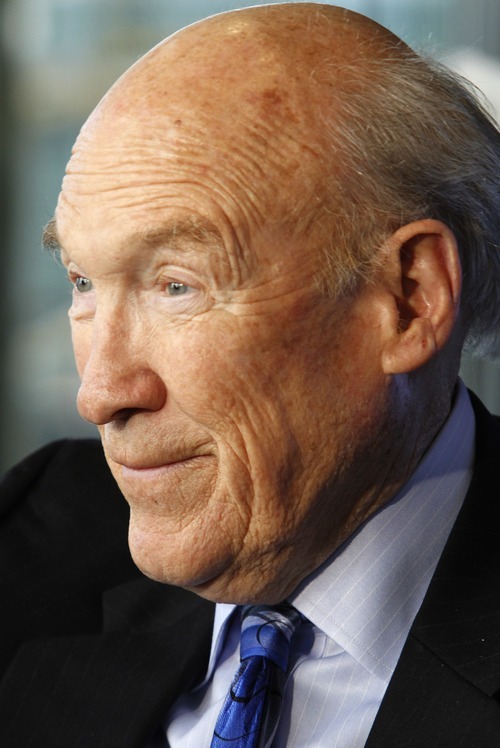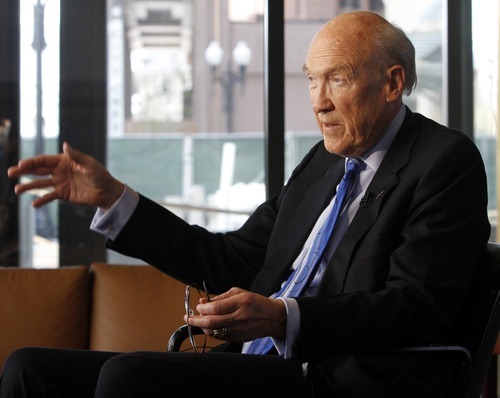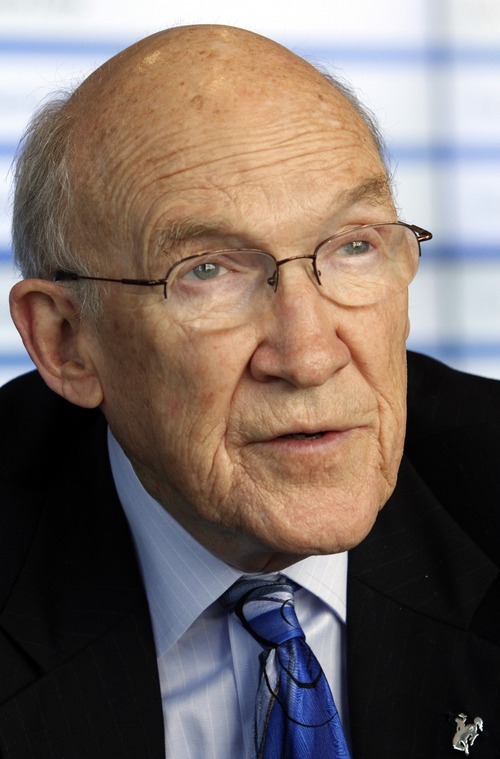This is an archived article that was published on sltrib.com in 2011, and information in the article may be outdated. It is provided only for personal research purposes and may not be reprinted.
Political parties, corrosive talk shows and a powerful lobbying effort by retired Americans blocking Social Security reform are the biggest obstacles to solving the nation's fiscal crisis, former Wyoming Sen. Alan Simpson said Friday in Salt Lake City.
Simpson, co-chairman of President Barack Obama's National Commission on Fiscal Responsibility and Reform, appeared emboldened to take digs at partisanship a day after Obama praised the report's findings.
"If we're not Americans first instead of Democrats and Republicans, we won't make it out of this hole at all," Simpson, 79, said during a Zions Bank-sponsored lunch.
The talk before about 200 banking officials, politicians and LDS Presiding Bishop H. David Burton was filled with folksy and sometimes edgy humor — even including a joke referencing erectile dysfunction. But the emphasis on reining in a national deficit that has become vogue to talk about had Simpson zeroed in on the big-ticket items that needed to be cut — Social Security, Medicare and defense spending.
"There is plenty of fat in the defense budget that doesn't have anything to do with defending the country," Simpson said.
Simpson, who has been out of office since 1997, acknowledged that he's more free to speak openly than those who are elected and are beholden to political parties — saying that even suggesting having military veterans spend more in health insurance premiums or that Social Security wasn't intended to be a retirement system puts you in the cross hairs of talk show personalities like Glenn Beck, Keith Olbermann or Rush Limbaugh.
"You don't bring that up or else you hate veterans or hate kids or you're part of the cat food commission," he said. "You deal with immigration honestly and you're a bigot or a racist — that's what's out there, and America falls prey to it."
The commission that Simpson co-chaired with Erskine Bowles, former chief of staff to President Bill Clinton, sought $4 trillion in deficit reductions and a decrease in debt to 60 percent of the gross domestic product by 2023 and to 40 percent by 2035.
It's not quite what House Republicans have sought in the way of cuts, however. On Friday, they pitched a proposal that would slash federal spending by almost $6 trillion over the next decade and would tackle Medicare reform — something Simpson said is vital to future fiscal health.
State Sen. Ross Romero, D-Salt Lake City, said he agreed with Simpson's call for bipartisanship to solve the fiscal crises facing the nation.
"At the federal level, people are coming in with more extreme philosophies and they get ingrained with the political structure in place," Romero said. "It has become more partisan and a lot harder to find common ground."
Simpson offered a stark view of where America is going on its current trajectory, saying the people who were making decisions weren't necessarily people who had the nation's best interests at heart.
He said toward the end of his 35-minute speech that he didn't know when the tipping point would come.
"People who love money care more about money than they do America, and they're not going to suffer," he said. "At some point in time … we won't disappear and we won't lose our greatness, but we won't be number one, and our integrity in the money markets will be imperiled."
Report of the National Commissionon Fiscal Responsibility and Reform
Six major components to $4 trillion in aggregate deficit reduction through 2020:
Discretionary spending cuts
Comprehensive tax reform
Health care cost containment
Mandatory savings
Social Security reforms
Process changes







